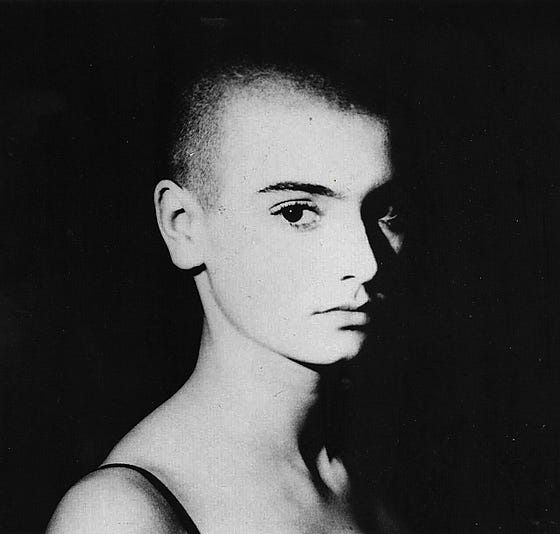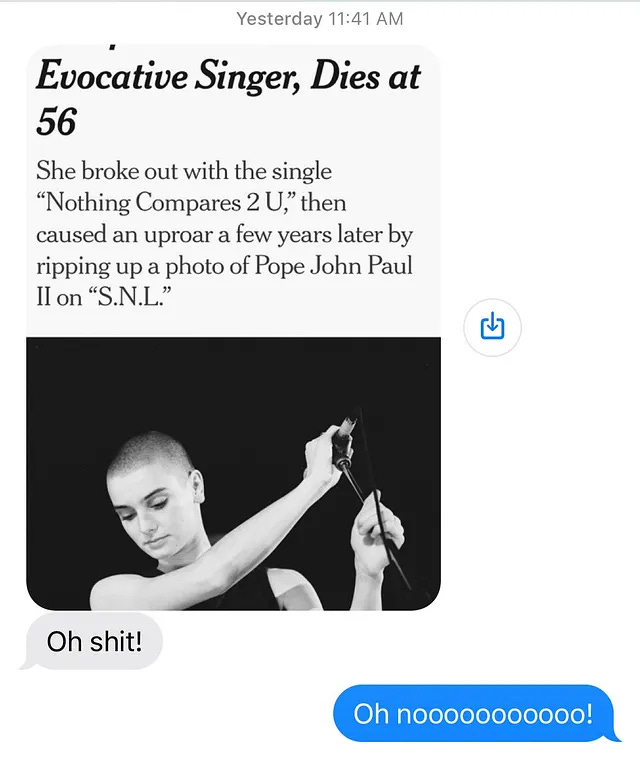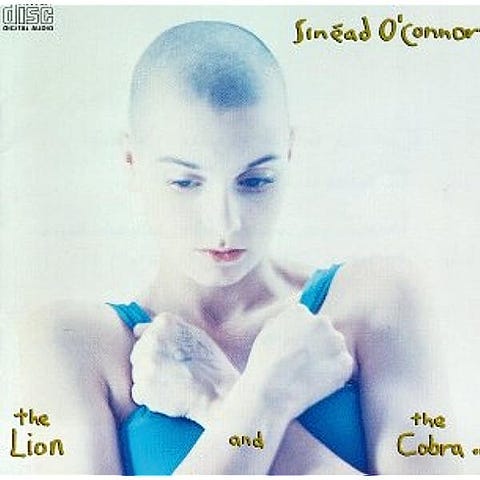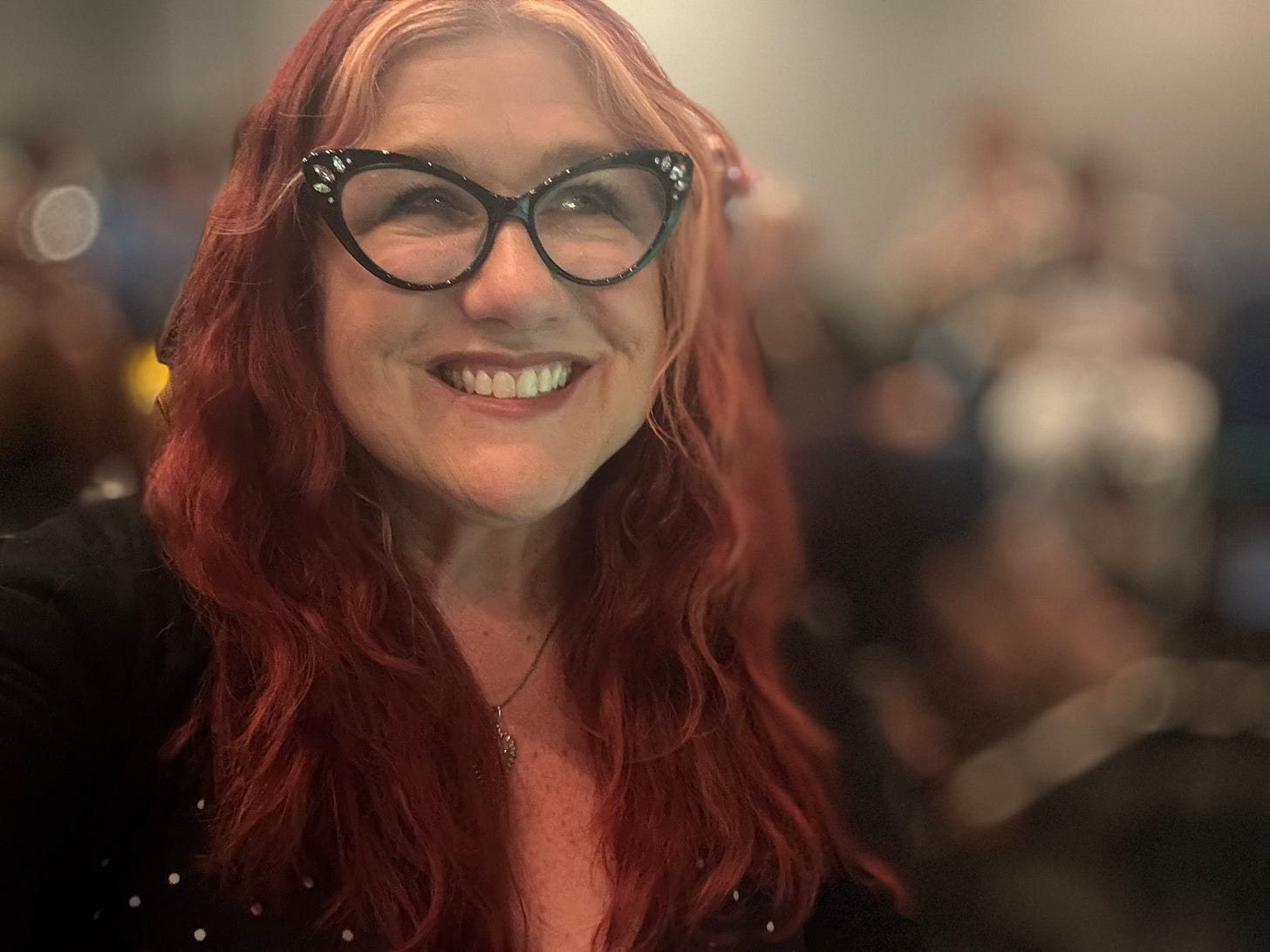
I will meet you later in somebody’s office
I was sitting outside at a cafe yesterday, having lunch with one of my favorite coworkers, when I got a text from my lifelong best friend, Lawrence Winnerman.
I gasped.
My coworker asked what was wrong and I showed her my phone…
She just stared at me blankly.
“Oh shit,” I said, quoting Lawrence, though for an entirely different reason. “You have no idea who she is, do you?”
She shook her head.
I work with many people 20 or so years my junior, and my lunch date was no exception. I’ve long gotten over myself that I have culture touchpoints my colleagues don’t share. But this one, at that moment — well, that hit hard. It’s a bit devastating to hear one of your favorite artists, one who made a huge impact earlier in your life, has not only passed, but also had already passed out of relevance even before her death.
I didn’t want to believe that so I asked her, “Surely you’ve heard ‘Nothing Compares 2U?’ The Prince cover?”
Again, no.
“I know you’ve heard it. The video is the close up of her perfect face, with a shaved head, and she cries while staring into the camera? Women karaoke it all the time?”
My coworker promised to have a listen when we returned to our desks.
And I accepted what I already knew to be true: we GenX kids have our own unique set of influences — and they all either die tragically young (Elliot Smith, Jeff Buckley, Kurt Cobain), or end up with tragically reactionary views (Morrissey, Billy Corgan)*.
And the losses hit harder the older I get.
This one really, really hurt.
Soon I can give you my heart
This record. My god, the impact of this record on me — and so many of my friends, including Lawrence— can not be overstated.
We’d never heard (or seen) anything like it (or her).
Sinéad released her debut record The Lion & the Cobra during my senior year in high school. She was only a few years older than I was, but she possessed a preternatural talent, an emotional complexity, a raw rage and passion — and the voice to fully express it — that made her seem timeless, ageless, nearly otherworldly.
Songs on the album careen stylistically from sea shanty (“Jackie”) to danceable pop (“Mandika”) to seduction (“I Want Your Hands on Me”) to… I don’t even know how to describe “Troy,” with its bombastic orchestration, thunderous proclamations, hushed pauses, nearly banshee-like shrieks, and epic storytelling. It’s singular in its glory.
It’s not hyperbolic to say I’ve never heard another album like it, and I doubt I ever will.
I was no musical sophisticate at 17, and came to Sinéad via MTV with her first release off the record, the danceable “I Want Your Hands on Me.”
Watch her in this video; watch as she sings her frank lyrics of sexual yearning with such insouciance, such a lack of grace and hips to her moments, nearly indifferent to the camera and yet with such an intense gaze when she finally makes eye contact.
1987 Dana was both confused and intrigued. This song was my Sinéad gateway.
2023 Dana — watching this video for the first time in years, possibly decades — sees a fierce, frail wisp of a genius and aches to protect her. I want to warn her of what’s to come, knowing now the price she paid for her ferocity, the hardships she faced and the toll they took on her career and life. She wanted to live an uncompromised life, to live by her own policies; I don’t believe the 19-year-old in that video could’ve known the price of admission to that life.
Would telling her how it all ended have changed the way she chose to live?
At 19, she couldn’t see the flame…
I don’t know no shame.
I feel no pain,
I can’t.
I don’t know no shame,
I feel no pain,
I can’t see the flame.
Through their own words, they will be exposed
I remember somehow, improbably, watching the video for “The Emperors New Clothes” with my dad and stepmom when it first released in 1990. I have no idea how we came to be watching it — they were not music fans, and they certainly didn’t seek to know my interests, musical or otherwise — but I vividly recall sitting in their living room and watching it.
Sinéad softened her look a bit for this video, off her second release I Do Not Want What I Haven’t Got. She grew a bit of hair, softened her make-up, and donned ever-so-slightly more feminine attire. But still, she’s barefoot, she’s unsmiling, her dance moves, they’re awkward at best. She’s undeniably gorgeous but also, undeniably indifferent to what you see in her.
My father was perplexed by her, making dismissive grunts and uttering things like, “What is this noise? What’s she wearing? These lyrics don’t make sense” throughout.
I can’t recall his exact admonishments, years later. I just remember he was outraged this young female singer wasn’t trying to catch his eye or his ear.
How I relished watching his discomfort. I felt so seen in his unease.
I wasn’t one of the pretty ones. I wanted to lead with my brains and talents, to sleep with a clear conscious, as Sinéad did. I understood her lyrics perfectly.
And most of all, I understood how off-putting her indifference was — to all men — via my sexist, irritable father.
Nothing can take away these blues
Her sophomore release also contained “Nothing Compares 2 U,” the Prince cover that catapulted her from alternative artist to chart topper. Suddenly Sinéad was a household name.
And she wasn’t going to be famous and not make it count.
She made that stand on live TV, on Saturday Night Live in 1992, the famous moment when she sang Bob Marley’s “War” a cappella, and then held up a photo of the Pope and tore it to pieces.
Watch her face. She was fearless.
I watched her perform that live.
I recall my jaw hitting the ground. I watched with my two grad school roommates, one Jewish, one Catholic. We all looked to each other in disbelief. I was in a deeply anti-religious phase then — one I’ve never fully exited, to be honest — and I applauded her.
But even then, what did my applause mean?
I finished school and grew up. New music kept coming through the 90s and onward, and I moved along with it. I’ve always loved Sinéad’s music, but didn’t keep up with her career much, other than to hear of her mental health struggles.
I think many of us did this, just as she needed more support. We grew up and musically moved on.
I am stretched on your grave
In 1988 we had no collective vocabulary for trauma, for self-care, for the sort of outspoken demonstrations that defined Sinéad’s career as much as her music did. The late 80s knew outrageous fashion and hairstyles, but we were still deeply normed, we young adults influenced by the heavy-handed morality of the Boomers who outnumbered and overpowered us.
We had no ability to defend the unyielding moral force that Sinéad was.
I’d say she was ahead of her time and surely there’s a nugget of truth there. But also, she transcended time. Her flavor of defiance and forthrightness would’ve made obsessive fans and enemies alike in any era.
And yet… I contemplate my young coworker. She messaged me once she watched the video for “Nothing Compares 2 U.”
“I have heard this song before. I am sure someone sang it on American Idol or something lol” she responded.
Sigh.
Sinead’s not even stretched on her grave yet and I’m certain she’d be rolling in it if she heard that as her legacy.
This coworker is young but an old soul, and a music fan. I consider sending her more, better Sinéad songs, and sharing her stories. But would either translate?
Or did you have to be young and hungry for authenticity in 1988 to first hear The Lion and the Cobra to feel its impact? I’m uncertain, but feel like the answer here may be yes. As timeless as I find the songs, I wonder if they’d get lost in generational translation.
This weekend I will play some Sinéad songs for my kids, and I usually have good instincts how new-to-them old music will hit. I’m unsure Sinéad will make the mark.
Her songs may simply be a unique GenX marker.
It’s just like you said it would be
And her stories? Here I’m more certain Sinéad was ahead of her time. Challenging the Pope for child abuse no longer seems radical, because hindsight shows that Sinéad was right. To people the same age as my coworkers or kids, this is old news. What was a collective, career-ending gasp in 1992 is a yawn in 2023.
This thought just makes me so sad.
Sinéad was right about so much, even if we all couldn’t — or wouldn’t — see it yet.
I was a fan of both Sinéad’s music and her political stances, and quietly cheered her on. I stood by, bemused a bit by her rage. I didn’t speak up. And really, speak up where? I had no platform in the 1990s, none of us did. I wonder, how would Sinéad’s rallying cries have resonated in a social media environment where everyone has a voice, versus the corporate news voices of the last century?
Sinéad might have gotten the support she clearly needed for her mental health if she’d been young and beautiful in 2023. Her directness probably would read as a form of neurodivergence now, and perhaps that’s what it was. Her history of trauma would have earned her sympathy. Her mental illness would be normalized, supported.
But as a young adult in the 1990s, she was a pariah for her views, her outbursts, her unprocessed trauma. And by the time the world caught up, she’d grown older and fatter, her formerly beautiful face, haggard. The press were merciless; fame came with no sympathies, and her strange behaviors and disappearances barely registered a blip on the news cycle.
Morrissey, as much as it pains me to say it, said it best.
The cruel playpen of fame gushes with praise for Sinéad today … with the usual moronic labels of “icon” and “legend”. You praise her now ONLY because it is too late. You hadn’t the guts to support her when she was alive and she was looking for you. The press will label artists as pests because of what they withhold … and they would call Sinéad sad, fat, shocking, insane … oh but not today! Music CEOs who had put on their most charming smile as they refused her for their roster are queuing-up to call her a “feminist icon….” when it was YOU who talked Sinéad into giving up … because she refused to be labelled, and she was degraded, as those few who move the world are always degraded.
It’s safe to feel sad now, to champion her legacy and lament her shortcomings, now that her final chapter is written.
I should’ve done better.
I should’ve kept up.
We all should have, all the alternative GenX kids who bought her two first absofuckinglutely brilliant album, now tucked away in an old CD case, or burned down to our hard drives. We remember her fondly but never bothered to sustain her career into the next few decades.
We all popped in The Lion and the Cobra again, but not till she was gone.
I grieve that for her and for all of us.
Everyone can see what’s going on
All that said, I’ve loved revisiting her early work this week. It’s been such a comfort.
I’m listening now as I type this.
“Whatever it may bring,
I will live by my own policies.
I will sleep with a clear conscience.
I will sleep in peace.”
Sleep in peace, Sinéad, and rest in power.
All of us who loved you, we’re immeasurably better off for having experienced the wonder of your music and the force of nature of your life.
Even if we never knew how to deserve you.
Maybe it sounds mean.
But I really don’t think so.
🖤
*Except for Robert Smith. He remains perfect.
Greetings!
I’m Dana DuBois, a GenX word nerd living in the Pacific Northwest with a whole lot of little words to share. I’m a founder and editor of three publications: Pink Hair & Pronouns, Three Imaginary Girls, and genXy. I write across a variety of topics but parenting, music and pop culture, relationships, and feminism are my favorites. Em-dashes, Oxford commas, and well-placed semi-colons make my heart happy.
If this story resonated with you, why not buy me a coffee?
(Make mine an iced oat milk decaf mocha, please and thank you.)






Oh holy hell wrench my got, I weep and weep and love and love. If I didn't have a skull that looked like Dresden leftovers I'd shave my head
If it were possible to wear grooves into CDs, this one would have fallen apart in my player before I’d left my teens.